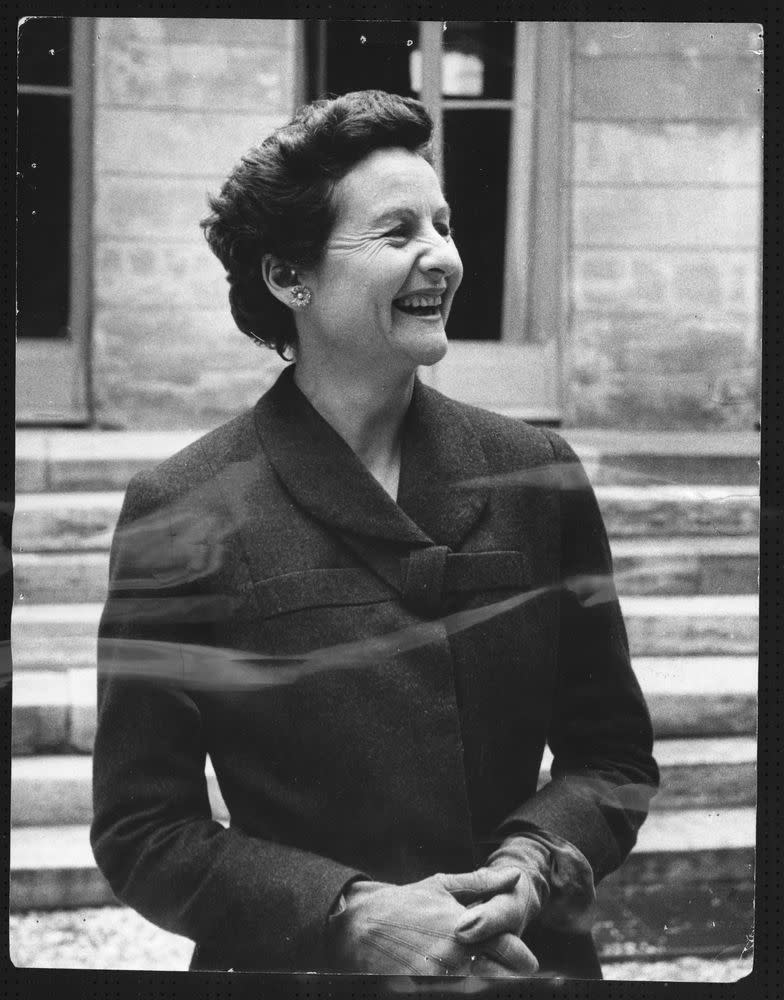Emily Mortimer: why The Pursuit of Love is 2021's most relevant period drama

Emily Mortimer, who has enchanted audiences as a character actress for nearly three decades, is stepping behind the camera for the first time. In our May issue , ahead of her directorial debut – a BBC adaptation of Nancy Mitford’s The Pursuit of Love – she talks to Lydia Slater about missing the UK from her Brooklyn home, forming a production bubble with her family and learning to enjoy her own authority.
It is entirely appropriate that Emily Mortimer has chosen Valentine’s Day for our discussion of The Pursuit of Love. Nancy Mitford’s tragicomic masterpiece, published in 1945, centres around the aristocratic Linda Radlett, whose life ricochets from one unsatisfactory relationship to the next before she eventually finds true passion with a suave French duke.
Mortimer has adapted the story in three episodes for the BBC, and takes a cameo role as the Bolter, flighty mother of the book’s clear-sighted narrator Fanny. But more significantly, this is also her directorial debut. (Indeed, one of the reasons that she is at home in Brooklyn today, rather than spending a romantic weekend in LA with Alessandro Nivola, her husband of 18 years, is that she is deep in post-production. "So we’re just sending each other depressing gift baskets," she says, laughing ruefully.)

On paper, Mortimer would seem the perfect choice for such a project. Witty, intelligent, self-deprecating and charming, she springs from an eccentric and upper-crust background that is positively Mitfordian. Her father, Sir John Mortimer, was the criminal barrister, bon viveur and creator of the crotchety Rumpole of the Bailey. He was, she says, "really obsessed" by the Mitford clan, and had written a play about Unity, the Nazi sympathiser and friend to Hitler who shot herself in the head at the outbreak of World War II. "He talked about her a lot. And he always told me funny stories about the Mitfords," she recalls. One favourite was the tale of the family’s beloved pet goose, which they reluctantly agreed to sacrifice for Christmas dinner during the war. Strangled and plucked, the bird was left in the cold cupboard until the time came to put it in the oven, when it strolled out, naked but otherwise none the worse. Naturally, it was reprieved, and they knitted it a cardigan to keep it warm, which it wore for the rest of its life.
"Their poor mother, desperately trying to get her unruly daughters to give her some reassurance that they might lead sensible lives, would make them write down on a piece of paper how they would economise in a household on £200 a year. Every time, without fail, Nancy would write at the top of the page: flowers £199." Mortimer roars with laughter. She first read The Pursuit of Love as a teenager but at the time was more captivated by Jessica Mitford’s Hons and Rebels, which she would buy in bulk to hand out to her friends. Her plan, too, was to be a writer, and for a while, she had a column in a national newspaper.
But she was also a wonderful natural actress; she and I were a year apart at St Paul’s Girls’ School and I recall her luminous performance as Irina in Chekhov’s Three Sisters, though I can’t remember at all whom I portrayed. While appearing in an Oxford University student play, she was spotted by a TV producer who cast her in the 1995 adaptation of Catherine Cookson’s The Glass Virgin. The following year, she made her film debut alongside Val Kilmer in The Ghost and the Darkness, then had a cameo in Notting Hill as the ‘Perfect Girl’. Kenneth Branagh’s Love’s Labour’s Lost was to prove a turning point: she fell in love with Nivola, who played the King to her Katherine. They married in 2003, and soon after, she followed him to America, in order to further her film career.

The gamble paid off: she has taken major roles in in numerous well-regarded films, from Shutter Island, opposite Leonardo DiCaprio, to Mary Poppins Returns, and the recent, terrifying, Relic, as well as writing and starring in the much-loved comedy-drama series Doll & Em, with her childhood best friend Dolly Wells.
Now she has dual British and American citizenship, but she has never stopped missing the UK. "I’ve got loads of Royal Family commemorative plates, and the children have Union Jack lampshades,’ she confesses. The pandemic has only exacerbated her homesickness. ‘My whole life depends on travelling, and the only reason it’s OK living here is because it’s so easy to get back home and see my mum and my sister and my nephews and the people I love and miss. Covid-19 has made it apparent that this isn’t something you can or should take for granted."
Naturally, then, when she was approached by the producers, who had seen and enjoyed Doll & Em, she jumped at the chance to adapt Mitford’s witty paean to her family, redolent with nostalgia for an aristocratic way of life that even in the writer’s lifetime had ceased to exist. When Mortimer reread the book, she says, she was struck by how "radical" it was. "The way that Mitford writes is extremely bold. She’s brutal and funny, and searingly honest about difficult topics such as not liking your baby or being beaten by your father. She deals with all these things with such a light touch. We’re living in a time when you feel nervous about saying anything, but this female voice is so unafraid."

Mortimer’s first task was to try to make a novel which begins shortly after World War I and culminates in the Blitz relevant to today. Pre-pandemic, she had decided it could be interpreted as a Brexit narrative. "Uncle Matthew [Lord Alconleigh, the terrifying Radlett paterfamilias] is completely xenophobic, the only place to be is England, and anywhere outside is to be feared and mistrusted. He keeps his children locked up in a castle and refuses to let them out, refuses to educate his daughters and as a result all of them want to get away as far as possible and experience the world, and they realise it’s full of wonder and difference.
"But then everything changed overnight, and we were in a pandemic where people were dying. I started thinking, well, what is this about now? And the book speaks to that too – almost more so: this feeling of life being very fragile and that people you love may not be there the next day, or you may not be able to see them for months. What does that do to the way you should live life? Should you hurl yourself at experience, because we might all die tomorrow, like Linda, or should you live life in a more careful and considered way, like Fanny?"
The series was shot last summer, much of it at Gloucestershire’s Badminton Estate and Rousham House in Oxfordshire (the location for Alconleigh, the Radletts’ grandly dilapidated manor), in the months between lockdowns. Filming was assisted by social-distancing being easy to maintain on such large estates, and also by the fact that Mortimer cast numerous members of her own family, including her mother and both her nephews. "If you’re related to each other and you’re in a bubble it makes it much easier to get you onto a set," she explains. Her daughter May, who is 11, plays young Jassy Radlett, while 17-year-old Sam embodies the teenage Matt Radlett. "It was seen as total nepotism and much frowned upon, but they have both since been cast as the kids in Noah Baumbach’s new film – Adam Driver and Greta Gerwig are their parents, so they’ve had an upgrade! They are really good actors, it’s not just that they’re my children," she assures me. "And George, my brother-in-law, is one of the Bad Seeds, so I got him helping with the music. I made it a family affair." The glittering cast is headed by Lily James as Linda and Emily Beecham as Fanny, with Andrew Scott playing the Radletts’ eccentric neighbour Lord Merlin, and Dominic West and Dolly Wells as Lord and Lady Alconleigh. One suspects that Nancy Mitford herself would have been amused but not surprised by the scandal that erupted last October, when James and West were photographed together in Rome, apparently canoodling. "Mitford’s book is about the messiness of life, which is something that we all experience, every single one of us, at some point in our lives, so the best people are non-judgemental," says Mortimer.
She admits to several sleepless nights worrying about whether, after a career in front of the camera, she was capable of directing. "As an actor, you are infantilised and told what to do all the time. You’re literally given pocket money, woken up by somebody, picked up here and taken there and you’re powerless. I am very good at that. But suddenly to be in charge of this whole system! I have a very awkward relationship with authority – I have none, basically. I don’t like to upset anybody, and I find any confrontational conversation really stressful."

Greatly to her surprise, however, she discovered that she enjoyed telling others what to do. "For the first time in my life, I found myself able to be quite direct. I do think it’s important to know that you can do it. It’s cool to be a woman of our age who’s suddenly powerful, in charge, and to feel that’s OK. And the amazing thing about directing is that there’s no time to think at all – unlike acting, when you have a lot of time both before and during the process to sit and think about how bad you are, and how you’re going to humiliate yourself on an international level." Indeed, she says her only uncomfortable moments on set were when she was directing her own performance as the Bolter. "It was so embarrassing running around with a wig on, looking at the monitors and giving people direction. I can’t watch myself on screen anyway, and I was in such a state of terror, and dead behind the eyes. On those days, I was neither an actor nor a director – it was really bad."
But overall, the experience of directing has given her a new respect for actors and their craft (which, in her own case, she used to think was a frivolous waste of an expensive education). "I felt such admiration and pride for them," she says.
Mortimer has various other projects in the pipeline, including a pilot for a Rumpole series she has written with her sister Rosie, and a role in a new film Wells is directing, but she has clearly been bitten by the directing bug. "I felt weirdly happy doing it," she says. "Though it’s going to be horrendous when people judge it, because if it’s bad, it’s totally my fault." Her aim, like Mitford’s own, has been to offer up a delicious treat with hidden depths. "The story is very forgiving about the complications of being alive and making mistakes, and life being confusing and hard and full of joy and full of pain too," she says. "I hope that there’s some of that in this adaptation."
‘The Pursuit of Love’ will air on BBC One this Sunday.
In need of some at-home inspiration? Sign up to our free weekly newsletter for skincare and self-care, the latest cultural hits to read and download, and the little luxuries that make staying in so much more satisfying.
Plus, sign up here to get Harper’s Bazaar magazine delivered straight to your door.
You Might Also Like


